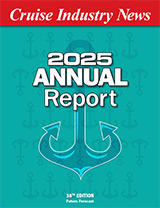Carnival Corporation has reported net income of $396.2 million, or $0.67 per share, on revenues of $1.23 billion for its third quarter ended August 31, 2000, compared to net income of $415.1 million, or $0.67 per share, on revenues of $1.17 billion for its third quarter of 1999.
Net income for the nine-month period ended Aug. 31, 2000 was $771.7 million, or $1.27 per share, on revenues of $2.93 billion, compared to net income of $776.2 million, or $1.26 per share, on revenues of $2.71 billion for the same period last year.
Carnival said that the higher revenues during the third quarter of 2000 were primarily driven by an 11.3 percent increase in capacity year-over-year.
Carnival Corporation Chairman and CEO Micky Arison commented that operating results were largely in line with expectations given what he called continued pressure on cruise pricing, significantly higher fuel costs, and the loss of five seven-day cruises due to the unscheduled drydocking of the Paradise.
Looking ahead, Arison said that the fourth quarter was shaping up as expected with continued pressure on pricing, although comparisons with prior year net revenue yields may be somewhat better than third quarter comparisons. Higher fuel costs are also expected to impact the fourth quarter, according to Carnival.
For its fiscal year 2001, Arison said he was encouraged by strengthening booking trends and optimistic that the company will see a positive earnings growth for the full year. However, due to unusually high-priced Millennium sailings in the first quarter of this year, net earnings for the first fiscal quarter of 2001 are expected to be lower than this year’s first quarter.
Arison also said that the closing down of Premier Cruise Lines was expected to have a positive effect on the Carnival Cruise Lines brand. In a conference call to analysts, Carnival Corp. executives forecasted earnings per share in the range of $1.80 to $1.85 for 2001.
Analysts reacted favorably and Carnival stock has moved up more than $3 since the quarterly report.
Regarding Premier and Carnival, Arison said, “The ships competed on many itineraries – in Port Canaveral, Houston, Tampa and New York.”
He described Premier as the price leader, undercutting Carnival’s pricing.
“But without Premier’s low pricing out there, Carnival has more flexibility in the same markets,” Arison added.
The repair issue of the Azipod units have not been settled yet, according to Arison, who said that ABB was working to find a technical solution to the problem.
As Carnival completes the purchase of Costa Crociere, the results for the Italian cruise line will be consolidated into Carnival’s corporate balance sheet as of Nov. 30 on a current-month basis. Costa’s results are now reported with a two-month lag.
Arison also underscored that the reports of two to three Carnival ships being for sale ”have been terribly misreported.” He said it was unlikely that any Carnival ships would be put on the market before the Premier ships have been sold.
While Airtours has been producing losses, Arison expressed his confidence in the company in response to analysts’ questions and noted that the company has a significant upside.
In terms of Costa’s contributions this year, lower earnings were attributed largely to the strong dollar and higher fuel costs.



